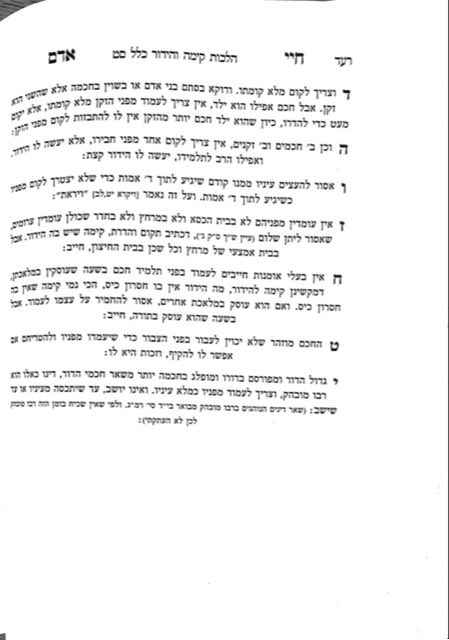We are discussing the halachos of kavod talmidei chachamim, specifically the halachos of hiddur. We left off with the question of someone from whom one has not learned for a long period of time, but rather someone from whom one picks up ideas or other thoughts based on the situation.
The Gemara discusses this situation regarding chavrusos. Obviously, we are not discussing someone learning with a rebbe (which would fall under the category of rabo she’eino muvhak, as we learned in shiur 1498), but two people of relatively equal stature. Over the years, there were plenty of points which one chavrusa had to explain to the other, and vice versa, and where one chavrusa had to have the patience to help the other, and vice versa. The Gemara says that the talmidim in Bavel would stand up for each other out of respect, and it is brought down that one should show an act of hiddur and respect by standing, albeit only slightly. It is not a chiyuv in the way it is a chiyuv to stand up for a rebbe, but it is a mitzvah kiyumis (not a mandatory mitzvah but a voluntary mitzvah), but it is appropriate that one respond with some element of kavod.
The above halacha refers to chavrusas who one learns with each other on a constant basis. However, even someone from whom one learns on an irregular basis should also be given some element of kavod. The Mishnah says that Dovid Hamelech learned two points from Achitophel, yet he would refer to Achitophel as rabi alufi u’meyuda’i. If a person understands the value of Torah, any point learned would be a reason to give kavod to an individual who taught even a minimal amount of Torah.
The Sefer Ve’ahavta Le’reiacha Kamocha discusses someone who was mekareiv someone else and made them frum. Even if the mekareiv did not teach the person specific elements of Torah, he showed him the proper way of life, so the chiyuv to give kavod applies. If the mekareiv taught the person basic Torah, it would certainly apply to an even greater extent.
If the mekareiv was a woman, the chiyuv kavod would be relevant as well. This point is not found in the poskim, but Rabbi Reingold discussed this point with another posek, and they felt it is correct.
Summary
- There is a chiyuv to give kavod to someone’s rebbe; that is, someone from whom one has learned Torah over an extended period of time. This would include someone who was mekareiv a person, even if the mekareiv was a woman.
- If someone learns with a chavrusa over an extended period of time, there is no chiyuv to stand up for the chavrusa, but one should give the chavrusa kavod. Standing is a mitzvah kiyumis.
- Similarly, there is no chiyuv to stand for someone from whom one learns on an irregular basis, but some element of kavod is expected.



